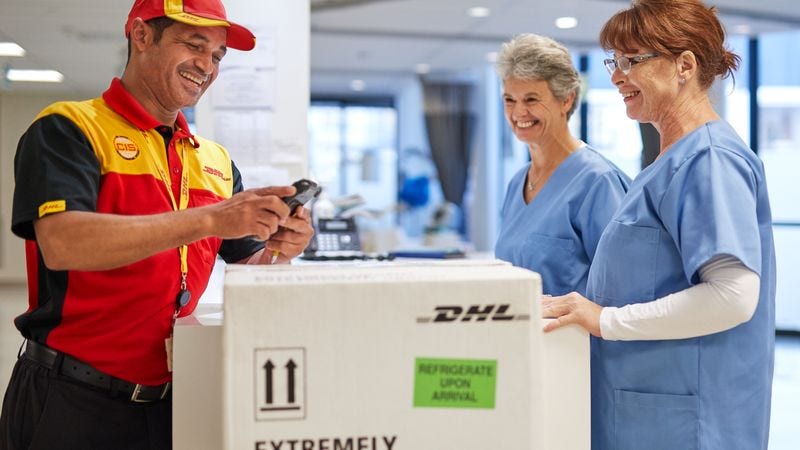In today's rapidly evolving healthcare landscape, the demand for medical supplies and pharmaceuticals is skyrocketing. One of the driving forces behind this surge is the world's ageing demographic, which is in increasing need of medical care. This includes everything from prescription medications to advanced medical devices.
However, it's not just the ageing population putting pressure on healthcare sectors. The emergence of new diseases, exemplified by the COVID-19 pandemic, has underscored the importance of a resilient healthcare infrastructure. The global race for vaccine shipments served as a real-world stress test, highlighting the vital role that pharmaceutical logistics providers play in safeguarding public health.
As per reports by Statista, the overall global pharmaceutical logistics market is projected to grow to approximately US$83 billion by 2025. Building on this report, Statista also forecasts the medical devices and products market in Vietnam to experience a growth rate of 9.71% from 2023 to 2028, reaching a market volume of US$2 billion by 2028.
This anticipated market expansion signals a promising opportunity for healthcare businesses in Vietnam to scale their operations locally and globally.
By leveraging DHL Express Vietnam's Medical Express (WMX) services, a specialised pharmaceutical and medical device shipping solution, businesses can seamlessly navigate the complexities of overseas shipping.
In this blog, we’ll delve deeper into DHL Express Vietnam’s role in supporting the nation’s healthcare industry's logistic needs.
Things to consider when shipping pharmaceutical products
Let’s explore the essential considerations on how to ship prescription drugs internationally, ensuring their safe and compliant transit across borders.
1. Temperature and humidity
Temperature and humidity are pivotal elements that can significantly impact the quality of medical supplies. This becomes even more complex in international shipping, where pharmaceutical products may pass through various climate zones, each with its own temperature and humidity challenges.
According to data from Statista, temperature monitoring has been a major challenge for shippers in the vaccine logistics and cold chain management sector. This issue is of utmost importance, considering deviations in temperature can undermine the effectiveness of vaccines and other pharmaceutical products.
We address this challenge by offering innovative temperature-controlled packaging solutions as part of our cold chain process. These include dry ice supplies for extremely low-temperature requirements, often as low as -80°C, and cold chain containers equipped with smart sensors tailored to meet stringent temperature requirements.
Our WMX service is versatile in its temperature accommodations, offering solutions for various needs. For frozen shipments, temperatures are meticulously maintained below -20°C. If your products require a room-temperature environment, we provide controlled ambient conditions that keep temperatures stable between 15°C and 25°C. Additionally, chilled conditions are available for items that must be kept at temperatures ranging from 2°C to 8°C.
This extensive array of temperature-controlled solutions ensures that we can meet the diverse needs of the pharmaceutical industry.
2. Compliance with regulatory requirements for shipping specific goods
The importance of regulatory compliance is critical when shipping specific medically-related goods. Non-compliance can result in legal repercussions, compromised product integrity, and a tarnished business reputation.
DHL Express Vietnam sets a high standard in this domain by offering standard shipping from Vietnam to overseas, fully equipped to transport items classified under UN3373 and UN3245 for customers with a DHL corporate account. These classifications often include medical specimens, diagnostic samples, and genetically modified microorganisms.
Our mandatory specialised training in accordance with aviation authority and International Air Transport Association (IATA) guidelines ensures that all medical supplies or shipments that pass through our network meet stringent safety and compliance standards.
As a result, businesses can have peace of mind knowing they’re partnering with a credible international express shipping service provider.
3. Lead times
Timely delivery is paramount in pharmaceutical logistics, particularly for high-priority and time-sensitive medical goods. This became evident during the initial rollout of COVID-19 vaccines. Delays in vaccine shipments resulted in slower mass distribution, increased transmission rates, higher casualties, and economic disruptions.
Our WMX service mitigates these risks by offering the earliest possible collection times and priority delivery. This involves using pharmaceutical cold chain packaging solutions, real-time temperature monitoring, and expedited customs clearance to minimise transit time.
This operational efficiency not only maintains the quality of medical supplies. It also gives businesses a competitive advantage, allowing them to reach the international markets more quickly.
4. Customs clearance documents
Navigating the complex landscape of customs clearance is a crucial aspect of shipping pharmaceutical products and medical devices overseas. The documentation required is often more extensive and subject to stringent regulations due to the sensitive nature of the goods. Below are some critical documents generally required:
- Commercial invoice: Provides details about the shipment, such as the shipper, receiver, description of the medical supplies, Harmonized System (HS) code, value and weight etc.
- Air waybill: Contains necessary information for DHL to transport the shipment, including but not limited to the address and contact information of the shipper and receiver, complete and accurate description of the medical goods being shipped, number of pieces, weight and dimensions.
- Certificate of origin: Verifies the country in which the goods were manufactured.
- Dangerous goods declaration: Essential for shipping hazardous medical specimens, biohazardous materials, or chemicals used in medical research.
- Customs declaration form: Used to declare medical supplies for import or export and calculate applicable international shipping costs.
Providing these documents completely and accurately can help to fast track the customs clearance process, as well as minimize the potential risks of delays and fines related to the pharmaceutical products and medical equipment.
DHL Express Vietnam's WMX service simplifies this intricate customs process for pharmaceutical business owners. Our in-house customs clearance support teams ensure that all necessary paperwork is in order and compliant with local and international regulations, thereby expediting the delivery and ensuring the integrity of the medical supplies.


